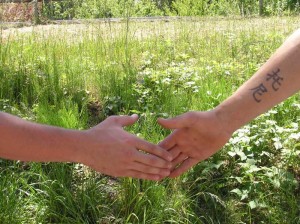Victims of crime
 In Germany, more than 6 million criminal offences are being committed on an annual basis. Victims often suffer a long time or even their whole life from the consequences. Unfortunately, they hardly receive enough counselling and practical assistance through appropriate victim support services. Hence, many victims struggle to work through the traumatic experience and to find healing in the aftermath of the offence.
In Germany, more than 6 million criminal offences are being committed on an annual basis. Victims often suffer a long time or even their whole life from the consequences. Unfortunately, they hardly receive enough counselling and practical assistance through appropriate victim support services. Hence, many victims struggle to work through the traumatic experience and to find healing in the aftermath of the offence.
Have you or anyone of your family members and loved ones been a victim of crime?
Would you like to
- Know, why your offender(s) could have done something like this and what is going on inside offenders in general?
- Express your anger and other resulting emotions and to confront offenders with the consequences and ripple effects of their crimes?
- Work through the traumatic experience and to embark on a healing journey?
Then the program “Victims and Offenders in Conversation” (STP) could be a helpful opportunity for you. In six encounters the participating up to six victims and offenders each share their thoughts and feelings with regards to their personal experiences of crime. The victims have the opportunity, to point out the consequences of crime and to share their very own personal experience and the damage done by the offence they witnessed/went through. This gives the offenders a chance, to change perspective and to develop empathy for the present victims and their stories, but also for their own victims – by sharing their crimes as well as by taking ownership for their thoughts, feelings and choices which led up to them. At the same time, all the participants go on a journey to overcome the past by taking the time before and after the crime in consideration:
- For the victims, the focus lies on the time after the offence – the aftermath (dealing with insurance, bank, doctors, police and/or court), the direct and indirect consequences on their thoughts, feelings and actions, the ripple effects on their social environment and their personal healing journey
- For the offenders, the focus lies on the time before the offence – their biography and own hurt, resulting values, thoughts, emotions and lifestyle (also the role of addictions, violence) in the sense of “hurting people hurt people”, or “damaged people are dangerous people”.
The journey includes the biblical story of Zacchaeus and various topics such as: confession, remorse, responsibility, reparation / compensation and restoration / reconciliation. In small groups, each participant can work through these issues and explore, how he / she can deal with the damage and ripple effects of crime – from both victim and offender perspective.
Goals for the victims:
- to work through the traumatic experience of crime
- to get the opportunity to share their story and be heard with respect, empathy and acknowledgement of their pain
- to be able to express their anger and all other resulting emotions
- to embark or advance on their personal healing story
Goals fort he offenders:
- to acknowledge and to take responsibility for the damage done by crime to primary (direct victims), secondary (family and loved ones of both victims and offender), and tertiary (their community and society at large) victims
- to (further) develop victim empathy – by taking their perspective and understanding their experiences on a mental and emotional level
- to consider how to make amends to the victims and their community
- to experience the possibility of receiving forgiveness and restoration through responsibility and change
Currently, offenders taking part in the program are young men between the age of 16 and 23 who are serving their sentence at Seehaus Leonberg. While being incarcerated within a prison facility, they have chosen Seehaus in order to make a significant change in their lives.
In conversations within individual and group sessions within the Seehaus program, the offenders are being confronted with the victim perspective and the roots of crime in their own lives. These sessions also serve as mental and emotional preparation for the VOC. While the Seehaus program is compulsory, the participation in a VOC is voluntary.
- Have you been a victim of crime?
- Are you a family member, neighbor or friend of a victim?
- Have you experienced harm (mental, emotional, physical, or societal) done by crime?
- Are you at least 18 years old?
Then feel free to contact us for further information or to register. We are looking forward to your participation and valuable input regarding your experience within the program „victims and offenders in conversation”.

 EN
EN ES
ES